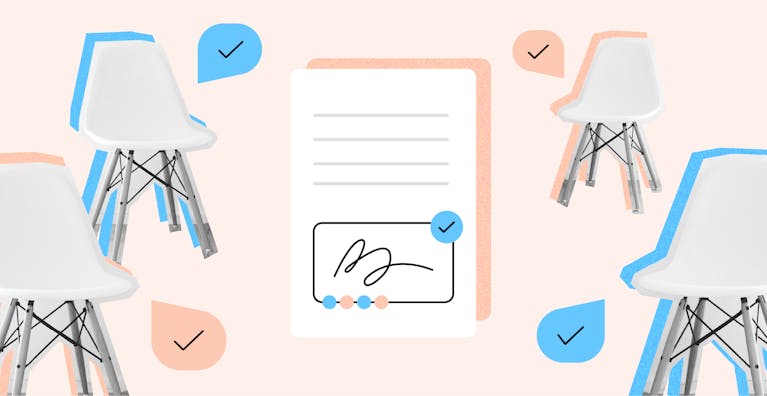In today’s fast-moving business landscape, digitising client contracts means more than just scanning documents. It’s about transforming the entire lifecycle of a contract—from creation to signature to secure archiving—into a fully digital, automated, and legally compliant process. This includes using electronic signatures, integrating with your existing systems via APIs, setting up automated workflows, and ensuring GDPR and eIDAS compliance.
For UK businesses, the case for scaling contract digitisation is clear: it speeds up operations, reduces manual errors, ensures regulatory compliance, improves client satisfaction, and significantly lowers administrative costs. Whether you're handling sales agreements, HR documents, or supplier contracts, moving from manual to digital at scale can be a game-changer.
In this guide, we’ll explore how to digitise contracts efficiently and securely, including best practices, real-world use cases, and a step-by-step roadmap. We’ll also show how Yousign supports UK organisations with tools like electronic signatures, automated templates, and secure digital archiving.
Why Scaling Contract Digitisation Matters
While many businesses have taken the first steps toward digitising contracts, doing so at scale is where the true value lies. Relying on manual processes or isolated digital tools often leads to delays, inconsistencies, and increased compliance risks.
The Limitations of Manual or Small-Scale Digitisation
Manual workflows or small-scale digitisation efforts typically involve:
- Scanning signed paper documents
- Emailing PDFs back and forth
- Storing contracts in shared folders or on-premise servers
These approaches may work for a handful of contracts, but they quickly become unsustainable as your business grows. Common challenges include:
- Delays in approvals and signing
- Risk of human error
- Non-compliance with legal requirements (e.g. audit trails, retention policies)
- Lack of visibility and version control
The Benefits of Scaling Contract Digitisation
Digitising at scale brings structure, automation, and security across your entire contract lifecycle. Key advantages include:
- Faster onboarding of clients, partners, or employees
- Streamlined procurement and vendor management
- Improved customer experience
- Centralised compliance and control
- Time and cost savings on admin tasks
Comparison Table: Manual vs. Scalable Contract Workflows
Aspect | Manual Workflow | Digitised at Scale |
|---|---|---|
Contract Creation | Word docs or PDFs created individually | Predefined templates and automation |
Signature Process | Wet signatures or scanned PDFs | Legally binding e-signatures with full audit trails |
Workflow Management | Email threads and reminders | Automated, tracked workflows |
Storage | Local drives or shared folders | Secure digital archiving with access controls |
Compliance | Hard to enforce and monitor | Built-in support for eIDAS, GDPR, and UK regulations |
Scalability | High risk of bottlenecks | Ready to handle high volumes of contracts |
Good to know:
Scaling contract digitisation isn’t just for enterprise-level companies. SMEs across the UK are using tools like Yousign to digitise processes in sales, HR, legal, and procurement—without heavy IT investment.
The Key Components of Scalable Contract Digitisation
To successfully digitise client contracts at scale, UK businesses need more than just a PDF and a signature tool. True scalability relies on a combination of integrated technologies, automation, and compliance features that work together across departments.
Below are the core components to focus on when building a scalable contract digitisation strategy.
APIs and Integrations
Application Programming Interfaces (APIs) allow you to connect your digital signature solution with the systems you already use—such as CRM, ERP, and HRIS platforms.
Use cases include:
- Automatically generating contracts from CRM data
- Sending bulk signature requests based on HR workflows
- Syncing signed documents back into your document management system
Yousign’s API enables this level of connectivity, making it easy to integrate digital signatures into your existing tools and workflows.
Automation Capabilities
Scalable contract digitisation is impossible without automation. This means setting up repeatable processes for creating, sending, signing, and storing contracts.
Key automation features include:
- Bulk sending of contracts (e.g. seasonal employment, partner agreements)
- Predefined templates with dynamic fields
- Custom workflows with automated reminders and status tracking
Automation not only reduces human error, it also shortens turnaround times and frees up valuable internal resources.
E-signatures and Legal Compliance
Digital signatures must meet strict legal and regulatory standards. In the UK and EU, that means complying with:
- eIDAS Regulation
- UK GDPR and Data Protection Act 2018
Yousign provides legally binding electronic signatures, with full audit trails, identity verification, and secure timestamping to ensure every signature is valid and enforceable.
Important:
Always verify that your e-signature provider meets both EU and UK post-Brexit compliance standards, especially if you operate across borders.
Try electronic signature for free for 14 days
Secure Storage and Digital Archiving
Storing digital contracts securely is just as important as signing them. With scalable contract digitisation, you need:
- Secure cloud storage
- Granular access management
- Digital archiving compliant with retention policies and audit requirements
Yousign offers digital archiving tools to ensure contracts are safely stored, retrievable, and legally admissible.
Step-by-Step Roadmap to Digitising Contracts at Scale
Digitising contracts at scale is not just about implementing a tool — it’s about transforming how your organisation handles agreements from end to end. Here’s a clear, actionable roadmap to help UK businesses make the transition effectively and in full compliance.
1. Audit Your Current Contract Workflows
Start by mapping how contracts are currently created, sent, signed, and stored across your departments.
Key questions to ask:
- Where do bottlenecks typically occur?
- Which teams handle large contract volumes?
- What tools are currently used (Word, email, shared drives)?
- Are current processes compliant with GDPR and UK regulations?
This step will help you identify inefficiencies, compliance risks, and automation opportunities.
2. Choose the Right Digital Signature Solution
Look for a solution that supports both scalability and compliance. Yousign offers:
- Yousign Forms for quick, reusable signature workflows
- Yousign API for deep integration with internal systems
- The Yousign App for managing contracts without complex setup
Each option is tailored to different business needs—from SMEs to large enterprises—with full compliance under eIDAS and the UK Data Protection Act.
3. Set Up Automation Templates
Define standard contract types used regularly, such as:
- Non-Disclosure Agreements (NDAs)
- Sales contracts and proposals
- Employment contracts
- Supplier agreements
Then configure pre-filled templates with dynamic fields for names, dates, roles, and other variables. This eliminates repetitive manual input and reduces risk of error.
4. Integrate With Core Business Systems
To scale effectively, your digital signature solution should integrate with:
- CRM systems (e.g. Salesforce, HubSpot)
- HRIS platforms for onboarding and HR documents
- ERP software for procurement and finance workflows
Yousign’s API makes these integrations simple, enabling contracts to be triggered and updated automatically from within your existing platforms.
5. Ensure Compliance With UK & EU Law
Your digitisation process must align with key legal frameworks:
- eIDAS Regulation (EU standard for electronic signatures)
- UK GDPR and the Data Protection Act 2018
- Any industry-specific regulations (e.g. FCA, NHS standards)
Ensure your tools provide audit trails, data protection, and identity verification where needed.
6. Monitor, Optimise, and Scale Further
Once implemented, track performance through KPIs such as:
- Average time to signature
- Volume of contracts processed per month
- Error rate or rejected signatures
- Compliance audit results
Use these insights to optimise workflows, train teams, and scale across departments or geographies.
Good to know:
Many organisations start with one contract type or department (e.g. HR) and expand gradually. This phased approach helps ensure adoption and long-term success.
Legal and Compliance Considerations in the UK
When digitising contracts at scale, compliance is not optional — it’s a legal and operational necessity. UK businesses must ensure that every step of their contract workflow aligns with national and international regulations governing data protection, electronic signatures, and digital recordkeeping.
Here are the key legal frameworks to consider.
eIDAS Regulation and the Post-Brexit Landscape
Although the UK has left the EU, eIDAS (Electronic Identification, Authentication and Trust Services) remains highly relevant. The UK has retained a version of the regulation known as the UK eIDAS, which continues to define the legal validity of electronic signatures.
There are three types of e-signatures defined under eIDAS:
- Simple electronic signatures (SES) – basic, low-assurance signatures
- Advanced electronic signatures (AES) – linked to the signatory and tamper-evident
- Qualified electronic signatures (QES) – the highest legal standard, equivalent to handwritten signatures
Yousign complies with the eIDAS framework, offering both simple and advanced electronic signatures suitable for most business use cases in the UK and EU.
GDPR and the UK Data Protection Act
Since 2021, the UK GDPR (based on the EU GDPR) and the Data Protection Act 2018 govern how personal data must be processed and stored in the UK.
When digitising contracts, you must:
- Obtain clear consent where required
- Store data securely and restrict access
- Ensure data can be exported or deleted upon request
- Maintain records of processing activities (e.g. signature logs, audit trails)
Yousign provides built-in features that support GDPR compliance, including:
- Secure cloud hosting in Europe
- Encrypted audit trails for every signature
- Access management and identity verification options
Important:
Always ensure that your e-signature provider is compliant with both UK and EU data protection laws if you operate across borders.
Industry-Specific Compliance
In regulated sectors, additional standards may apply. For example:
Industry | Compliance Considerations |
|---|---|
Finance & Banking | FCA rules on client communications, digital records, and auditability |
Healthcare | NHS digital standards, patient confidentiality, and secure archiving |
Legal Services | Admissibility of e-signatures in court, client confidentiality |
Government | Public procurement rules, identity verification, accessibility requirements |
Yousign serves clients across these sectors and provides features such as time-stamped signatures, tamper-proof documents, and compliance-grade archiving to meet specific regulatory needs.
Best Practices for Success
Digitising contracts at scale is not just about technology — it’s also about people, processes, and governance. Below are best practices to help ensure your transition to scalable contract digitisation is smooth, secure, and impactful.
Standardise Templates Across Departments
One of the biggest inefficiencies in contract management stems from using inconsistent or outdated templates. To avoid this:
- Create centralised, approved templates for each contract type (e.g. NDAs, employment contracts, MSAs)
- Use dynamic fields (e.g. client name, dates, job titles) to reduce manual entry
- Keep templates up to date with legal and regulatory changes
With Yousign, you can manage and update templates from a single dashboard, ensuring consistency across your entire organisation.
Train Teams to Adopt Digital-First Workflows
Technology adoption fails without user engagement. To embed digital contract processes into your company culture:
- Train users on how to use e-signature tools effectively
- Communicate the benefits (speed, compliance, ease of use)
- Identify internal champions to support change management
The goal is to make digital workflows the default, not the exception.
Use Audit Trails for Transparency and Compliance
Every digital signature generated via Yousign includes a complete audit trail — detailing who signed, when, from which device or location, and in what order.
Make sure audit trails are:
- Enabled by default
- Easily accessible for internal audits or regulatory inspections
- Stored securely alongside the signed document
This is particularly important in regulated sectors or for contracts that must be legally defensible.
Regularly Review Compliance and Process Efficiency
Scaling contract digitisation is an ongoing process. You should periodically:
- Audit your workflows for compliance with GDPR, eIDAS, and industry standards
- Review usage metrics (e.g. average time to signature, error rates)
- Gather feedback from users to improve template usability and automation logic
Use this data to refine your workflows, update policies, and scale across new departments or geographies.
Important:
Regular reviews ensure your contract processes stay efficient, compliant, and aligned with evolving business needs — especially as regulations shift in the post-Brexit legal landscape.
Common Pitfalls to Avoid
Even with the right tools, many organisations encounter roadblocks when scaling their contract digitisation efforts. Anticipating these common mistakes can save time, reduce risk, and accelerate adoption across your business.
Choosing Tools Without UK Compliance
Not all e-signature or contract management tools are adapted to the UK legal environment. Some providers may comply only with EU frameworks or lack clarity on post-Brexit data handling requirements.
To avoid this risk:
- Ensure the provider supports UK eIDAS, GDPR, and the Data Protection Act 2018
- Verify data hosting location and data protection certifications (e.g. ISO 27001)
- Confirm that audit trails and signature formats are legally admissible in UK courts
Yousign offers UK-compliant e-signature solutions with clear legal documentation and secure, Europe-based infrastructure.
Not Integrating With Existing Business Systems
A digital signature tool that operates in isolation limits your ability to scale. Many organisations adopt tools that don’t connect with their CRM, HRIS, or procurement systems, leading to redundant work and lost productivity.
Avoid this by:
- Prioritising API-first solutions that integrate seamlessly with your tech stack
- Automating workflows from data entry to archiving
- Ensuring contracts flow through a centralised digital process, not multiple disconnected platforms
Overcomplicating Workflows Instead of Simplifying
Digitisation should reduce complexity, not add to it. Some organisations attempt to automate every edge case, resulting in workflows that are difficult to manage and understand.
Best practices include:
- Starting with simple, high-volume use cases (e.g. NDAs, employment contracts)
- Limiting customisation in early stages
- Focusing on clarity, speed, and user adoption
As teams grow more confident, more complex use cases can be added gradually.
Ignoring Change Management
Digital transformation involves more than just tools — it requires buy-in from users and stakeholders. Rolling out a new system without adequate training or communication often leads to poor adoption rates.
To prevent this:
- Involve key departments early in the process
- Communicate the why behind the change
- Provide ongoing support and learning materials
Good to know:
A phased rollout focused on quick wins builds momentum and internal trust, making long-term adoption far more successful.
Conclusion: A Smarter Way to Manage Contracts at Scale
Digitising client contracts at scale is no longer optional — it's a strategic move for UK businesses that want to stay competitive, compliant, and efficient. From automated workflows to secure e-signatures and regulatory compliance, scalable digitisation streamlines every stage of your contract lifecycle.
With Yousign, you can:
- Reduce administrative burden
- Accelerate time to signature
- Ensure compliance with UK and EU regulations
- Deliver a seamless experience for clients, employees, and partners
Whether you’re just starting or ready to scale across departments, Yousign provides flexible, legally compliant tools designed for businesses like yours.
Ready to Scale Your Contract Workflows?
Start your free trial with Yousign

FAQ on Scaling Contract Digitisation
What legal risks exist when digitising contracts at scale?
The main risks include using non-compliant e-signature tools, mishandling personal data, or lacking proper audit trails. To mitigate these, use a provider like Yousign that ensures compliance with eIDAS, UK GDPR, and the Data Protection Act.
How do I ensure compliance with UK and EU regulations?
Choose tools that offer data encryption, audit trails, access control, and store data on servers compliant with UK and EU law. Yousign meets these requirements with certified infrastructure and built-in compliance features.
Which industries benefit most from large-scale contract digitisation?
Industries with high contract volumes or strict compliance needs — such as HR, legal, procurement, finance, and healthcare — see the most benefit from digitising contracts at scale.
What role does AI play in contract digitisation?
AI can help with contract analysis, template generation, anomaly detection, and lifecycle management. However, human oversight is still essential for compliance and legal accuracy.







